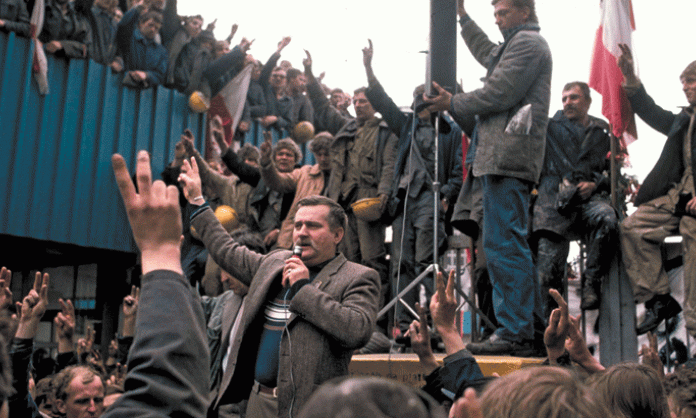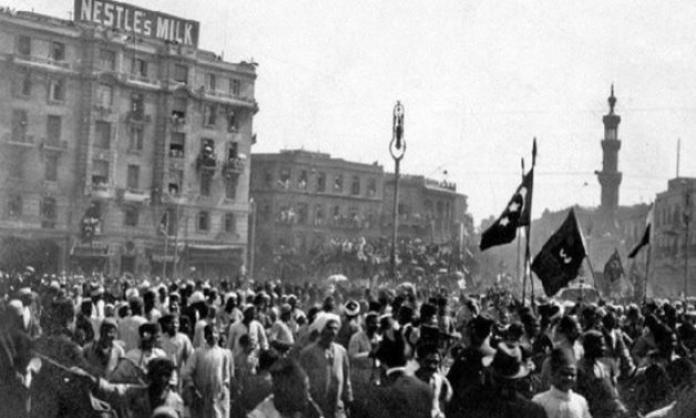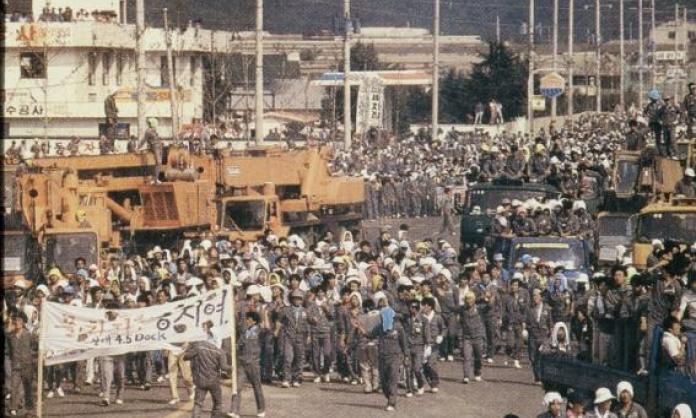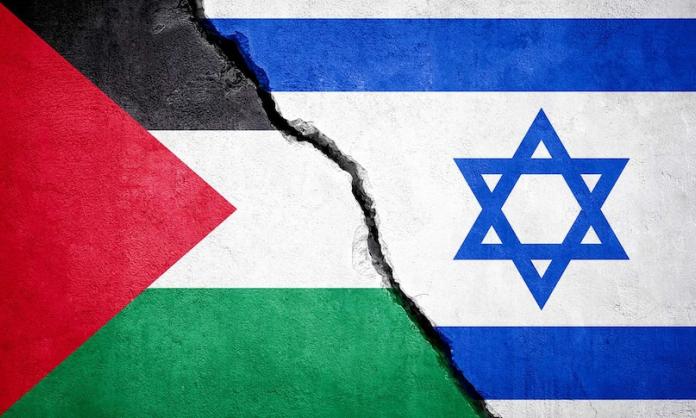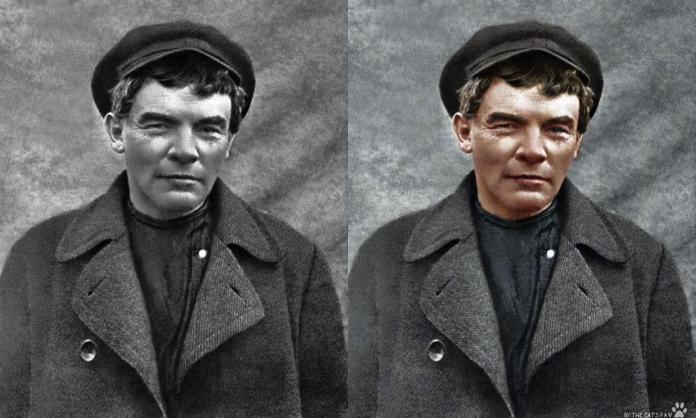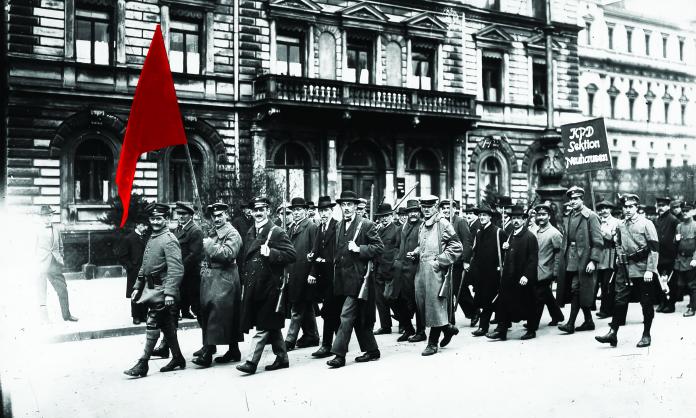In 1980, mass revolt rocked Poland. The movement for genuine socialism was alive and well even under brutal Stalinist dictatorship, writes Liz Ross.
Young activists smuggled protest posters into the workplace, holding huddled meetings, planning action. Then on 14 August 1980 came walkouts, a march around the site, pulling out one department after another, a halt at the gates to remember those killed in December 1970.
Then the gates slammed shut – the occupation began. Polish workers, who’d given the world the sit-in strike in the 1930s, were reviving a revolutionary tradition.
This was the birth of Solidarity. In the shipyards of Gdansk workers of Poland gave rise to one of the world’s most advanced workers’ movements.
The spark was the sacking of Anna Walentynowicz, a crane driver at the Lenin Shipyards, with a history of militancy from the 1950s, including a demand for equal pay. Every year Walentynowicz would mark the anniversary of Bloody Tuesday – the killing of striking workers at the shipyard in December 1970 – with a wreath at the gates.
On 7 August 1980, five months off her retirement, management fired her for a “major infraction of worker’s responsibilities”. This meant openly distributing copies of Coastal Worker, an illegal publication put out by a small group of independent trade unionists in Gdansk and the underground Committee for the Defence of Workers (KOR).
Outraged workers at the shipyards demanded her reinstatement. Within a week they staged an occupation strike, immediately electing a strike committee. More demands were added, and then followed two days of occupation and talks. Workers barricaded the shipyard for fear of an attack by the police; crowds of workers from around Gdansk collected at the gates; urgent messages passed back and forth between the shipyard and other striking workplaces in the region.
Management soon agreed to many of the demands, not only reinstating Walentynowicz, but also another sacked worker – Lech Walesa. It authorised pay rises and a memorial for Bloody Tuesday at the shipyard gates, but refused to agree to other demands such as an independent union.
Would workers accept the offer?
Political demands
It wasn’t just the strike that was in the balance. After two months of unrest around Poland following a jump in food prices, workers’ action had won many of their economic demands, but political demands, such as the repeated call for an independent trade union, were rejected.
Previous uprisings in 1956, 1970 and 1976 had won major economic concessions for workers, but none of their calls for political change were heeded. In 1970 the struggle was brutally put down by Polish forces, but all had faced the threat of Russian troop invasion, as occurred in Hungary (1956) and Czechoslovakia (1968). A similar threat hung over the 1980s actions. The question was, would the movement of 1980 go forward, challenging the system directly, or repeat the past, winning economic gains but with no political advance?
Initially it seemed the deal was enough. But when Walesa declared an end to the strike, other workers who’d gone on strike or come out in solidarity, protested. Krystyna Krzywonos, the tram workers’ strike leader, told Walesa: “You can’t fight tanks with trams – we’ll be crushed like flies.”
Walesa, as head of the strike committee, agreed to reverse the decision. But already many of the workers had left. Anna Walentynowicz tells how they “ran to the gate and I shouted, ‘Let’s have a solidarity strike!’” Then Alina Pienkowska climbed on top of some barrels: “We have to help the people from other factories because they won’t be able to defend themselves.”
Anna continues, “Alina’s quiet voice stopped the masses of people. One gate was closed – then another. Six thousand people stayed in the shipyard. For me, only in that moment did the Polish August begin.”
A new strike committee was formed, this time including delegates from other striking workplaces in Gdansk – several hundred in all. This Inter-Factory Strike Committee (MKS) was, as Colin Barker outlines in the book Revolutionary Rehearsals, a qualitatively new development.
Groups like the MKS had formed in 1971 in both Szczecin and Gdansk, but the new organisation went beyond these. In fact, it was closer to the workers’ councils or soviets of Russia in 1917 and Germany in 1918-19 than to the usual trade unions.
The demands of the new committee were now general, addressing conditions facing the Polish working class at large. The initial 21 demands included free trade unions, a guaranteed right to strike, the release of political prisoners and a list of specific economic demands. Barker writes, “their list clearly had immense political implications, launching the movement onto a new path that challenged the regime’s very basis”.
Almost immediately other MKSs formed around Poland. As in Gdansk, they began taking control of essential services, organising food and transport. They published their own newspapers, breaking through the state’s censorship. The Szczecin paper Jednosc (Unity) became a mass publication, not only reporting workers’ news, but also running articles that contested the political authorities’ views on the economic crisis, the nature of socialism and the role of the working class. In mid-September delegates from these committees – representing 3,500 factories and 3 million workers – met in Gdansk and took the new movement another step forward, forming a new national workers’ organisation: the independent self-governing union, Solidarity. Barker says, “In effect, the form now adopted was a centralised federation of soviets.”
Immense impact
The formation of Solidarity had an immense impact. Workers rushed to join, and within a few months membership had more than tripled to 10 million, about 80 percent of Poland’s working population. Students occupied, went on strike and organised their own Student Solidarity. In the countryside farm workers and peasants set up Rural Solidarity.
Over the next seven months, Solidarity was on the rise. Everywhere workers struck for their demands, winning economic claims and promises of broader political change. Protest actions developed workers’ self-confidence to take over aspects of running society. In Lodz workers ran the town; in other places people debated turning a police headquarters into a hospital and had discussions about how production should be organised.
Some argued that crucial changes were taking place within the working class. Quoting Marx, the Szczecin Higher Education Solidarity branch wrote that the proletariat was being transformed into “a class of people who understand the inexorable need to introduce far-reaching and radical changes in the relations of production and in the entire superstructure”.
Many wanted to turn this self-realisation of the Polish working class into something more than a mass union movement, namely an explicitly revolutionary working class party. Unlike the earlier uprisings, in the face of the corruption and political bankruptcy of the ruling Polish Communist Party (PUWP), reforming the party itself was rarely considered.
Instead, as Jacek Kuron, one of the radicals from the 1976 upheavals, said, “The awareness of the necessity for transformation is extraordinarily strong … Wherever we turn, everywhere there is a call for a party”.
Reform or revolution
Many of the leaders of Solidarity, however, were no longer revolutionaries, nor was there any organised revolutionary current within Solidarity to coordinate and build on such calls from the rank and file. Without an organised revolutionary base within Solidarity or outside it, revolutionaries such as Wroclaw-based Jozef Pinior could not hope to counter reformist trends in the short 17 months of Solidarity’s existence.
Other leaders such as Kuron had already moderated their stand, rejecting the call for a new party. Rather, he said, the union should compromise: “So we have on one side these great social movements, independent and self governing in various spheres of life; but on the other side the need to preserve [the PUWP’s] control over the central administration, the police and the army. It is necessary to reconcile these two things. We must do this. We must form a completely new model resting on compromise.”
But it was impossible to reconcile these forces competing for control of society. Compromise was a deadly illusion. While the PUWP had been thrown into disarray by the uprisings, many at the top of the party were implacably opposed to Solidarity and took every opportunity to prepare for its destruction.
In a vital test of strength between the union and government in March 1981, Solidarity wavered. After a brutal bashing of activists in Bydgoszcz, Walesa threatened industrial action unless the police were punished. He called off the threat after the government made promises. But as months followed, with the police untouched, the union leadership continued to hold back despite rank and file pressure to strike.
Workers began to lose confidence in the union. Where Solidarity had led, it now started to fall behind or even lose ground. Leading Solidarity activist Zbigniew Bujak commented:
“Our movement is weakening. At the beginning it was based on an implacable hatred for the regime and against the party. But today that is not enough … The protest strikes and the local struggles do not succeed in uniting [it all] into a coherent plan. In this phase people want a clear program.”
But because of the politics of compromise rather than revolution, Solidarity was unable decisively to challenge the regime. Barker writes: “In the dual power situation after August 1980 Solidarity possessed considerable blocking power, yet could not initiate general policies or decisions. It had undermined the regime but had not taken from it control of the means of production or administration.”
After Bydgoszcz, the regime increasingly gained confidence, pushing against Solidarity. The union leadership failed to understand the gravity of the situation until late November. By then it was too late. In the middle of an emergency committee meeting on 12 December 1981, the police rounded up all of the leadership and threw them in jail. Solidarity activists around the country were likewise arrested and at 6am on 13 December General Jaruzelski announced his military coup, the suspension of Solidarity and imposition of martial law.
Solidarity was a mighty organisation, the closest any workers’ movement had come since 1917 to the revolutionary soviets in Russia. It had developed from an inter-factory strike committee in Gdansk to a national organisation demanding elements of workers’ control of industry, moving from militant trade unionism to seeking political solutions. On the declaration of martial law, the union went underground, continuing to organise workers in defiance of the regime.
But it lacked a clear political direction, let alone a revolutionary perspective that could have begun to prepare workers for taking control of society. In fact it wasn’t until the late 1980s, when the military regime faced another economic meltdown, when Russia and its satellite Eastern bloc countries faced political implosion, that a small revolutionary group formed – the Polish Socialist Party-Democratic Revolution (PPS-RD) with activists embedded in Solidarity.
In this period of crisis, as the regime was partially democratising and a newly legalised Solidarity looked set to win the elections, I met and spoke with members of the PPS-RD. One of these was Jozef Pinior, a leader of Wroclaw Solidarity in 1980 and co-founder of the PPS-RD in 1987. Pinior was notable for hiding Solidarity’s financial resources from the state just days before martial law. Immediately going underground, he was frequently jailed between 1983 and 1988, but managed to stay active, including co-founding the famous underground Radio Solidarity.
In 1989 he talked to me determinedly about the need to organise in the working class, the need to rebuild the workers’ councils to open up the prospect of “workers’ power from below against the bureaucratic state and the market reforms”. Searching for a new analysis, he’d organised meetings to discuss the relevance of state capitalism to Eastern bloc countries. He was aiming for socialism, arguing that internationalism was crucial. “You cannot have socialism in one country. My conception is to build throughout the Eastern bloc.”
Again it was too little too late in Poland during the turmoil of the late 1980s. But the hope of workers’ power from below remains the lasting legacy of Solidarity.




